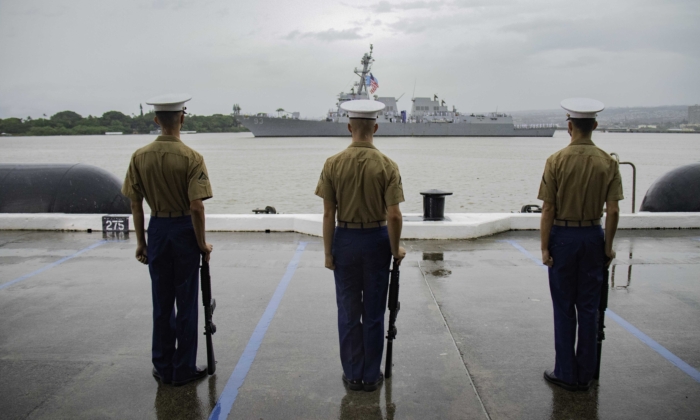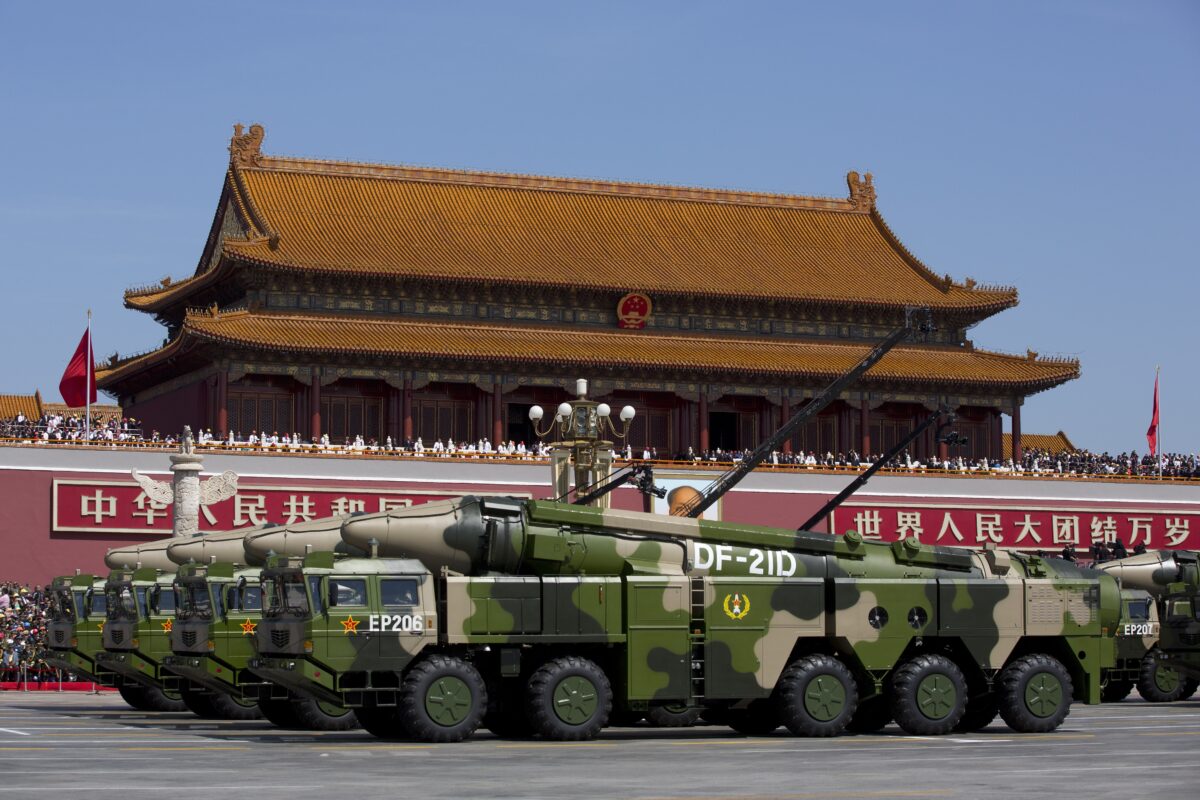Ellanjay
Well-Known Member
- Joined
- Dec 3, 2018
- Messages
- 58

Marines stand at attention as the sailors render honors to the USS Arizona Memorial during the 80th Anniversary Pearl Harbor Remembrance on Dec. 7, 2021. (U.S. Navy photo by Mass Communication Specialist 3rd Class Jeremy Lemmon Jr.)
The Next Sneak Attack
Morgan Deane
December 11, 2021
Epoch Times Commentary
Audio PDF
As Americans honor Pearl Harbor, they must be aware of the potential for another one. The Chinese regime’s history and doctrine favor sneak attacks.
The United States recently celebrated the 80th anniversary of Pearl Harbor. Americans should take a moment to consider why surprise attacks happen and how a Chinese sneak attack might appear. There is a theoretical basis, followed by recent history and doctrinal statements, that suggest Americans should be concerned, though not panicked, about a potential sneak attack.
History
As I’ve discussed before, China has a history of preemptive strikes since 1949. Its neighboring countries received one. The Chinese communists (Chicoms) attacked American forces in Korea in 1950. A few years later, they seized islands that belonged to Taiwan—in what is now called the Taiwan Crisis. It was only the timely intervention of American forces in the Taiwan Strait that prevented the Chicoms from seizing the rest of Taiwan. Just a few years after that, the Chicoms sought to readjust its borders with India in a short offensive strike in 1962. They targeted their allies, the Soviet Union, in 1969. In this case, there was another border dispute, and the area was militarized by both sides when Chinese commandos preemptively seized disputed islands in the Ussuri River.
Finally, the Chicoms fought a short but inconclusive war with Vietnam in 1979. Again, this was an offensive preemptive strike that ended with China confirming the transfer of key territory along its border. In addition to actual wars, the Chicoms have used force to intimidate their neighbors in the South China Sea.
In short, the Chinese regime has often fought offensive wars with each of its neighbors by utilizing a key strategic signature. There would be a great deal of tension where it claimed territory was unjustly stolen from China. It often initially assumed a defensive posture, but then used preemptive offensive strikes at the operational and tactical level to achieve victory. Then it defended the territory and waited for a ceasefire. This was seen most recently in the border skirmish with India last year.
Theory
As I discuss in my book, “Decisive Battles in Chinese History,” there is a strain of preemptive thought going back to Sun Tzu’s (also “Sunzi”) warnings. His writing is the most accessible of Chinese military thought, and it suggests that an overwhelming attack that induces a psychological collapse of the enemy is a preferred form of warfare. Sun Tzu admonished that the “highest realization of warfare is to attack the enemy’s plans.” And “subjugating the enemy’s army without fighting is the true pinnacle of excellence.”
When the army unleashes its plan, it should be successful and as easily victorious as a torrent of water unleashed from a dam, a bolt released from a crossbow, or a stone rolling down a mountain. He concludes that “one who knows the enemy and knows himself will not be endangered in a hundred engagements.”
One of the problems with the “Seven Military Classics” and Sun Tzu’s “The Art of War” is that, much like the Bible, it is a collection of writings that have been redacted over time that can be used to support different positions. There are also many competing authors with different and sometimes directly contradictory theories about warfare. This leads to a good deal of debate about the exact nature of Sun Tzu’s advice, but this still has influence in modern Chinese thought.
The Chinese regime has not forgotten this heritage in its modern objectives and training manuals. Mainland China’s National Defense emphasizes “rapid assaults” using a variety of orthodox and unorthodox methods, such as cyberattacks or using new technology in drone swarms. U.S. defense analysts warn that the “PRC [People’s Republic of China] continues to pursue [the ability] to fight and win short duration [conflicts].” The first principle of the Chinese Air Force is securing initiative through offensive operations.
Next Attack
There is a theoretical basis for the attack supported by China’s recent history. But what might that look like in the next war?
This conflict could look like several different things. Using the new “carrier killing” and hypersonic missiles launched by more advanced fighters, the Chicoms could overwhelm and surprise American forces, such as the U.S. Seventh Fleet stationed in Japan.

Chinese military vehicles carrying DF-21D anti-ship ballistic missiles, potentially capable of sinking a U.S. Nimitz-class aircraft carrier in a single strike, drive past the Tiananmen Gate during a military parade in Beijing, China, on Sept. 3, 2015. (Andy Wong/Pool/Getty Images)
The launching of hundreds of missiles within mere minutes to a theater with forces at fewer alerts than those in the South China Sea could be decisive. The new risk-averse public led by an administration in Washington that clearly doesn’t want war, and refused to do much against Russian aggression in Ukraine, could then prompt Beijing to look for a quick settlement and resolution. This essentially means that China would win a conflict in one strike. Like the advice of Sun Tzu, the attack would show a knowledge of Chicom forces, American disposition, and the ability to deliver a quick, stunning blow that “attacks the mind” and the enemy’s plans (for example, by striking a ship in port), and could win a war without a single soldier firing a bullet.
In a fictional global war of 2030, the attack would begin after tension in the South China Sea through the Chinese regime’s malware and cyberattacks at the stroke of midnight on Black Friday. Mainland Chinese supercomputers then black out American satellites: U.S. countermeasures, such as drone strikes, fall harmless into the sea as their navigation systems are corrupted. Starting to panic, the U.S. Navy tries to counter-attack, but launch codes on Zumwalt-class Destroyers tasked with destroying the enemy’s satellites no longer work.
The U.S. Navy then has difficulty sailing through the narrow passages in the South China Sea without its navigational computers. By this point, the Chicoms start sending missiles to knock out communication satellites and ground the high-tech fighters, like the F35 that rely on complex data. With American fleets rudderless, flights grounded, and communication in disarray, Russia and China assume direct control of disputed territory across the world. And by the time the United States gains its war footing, it is presented with a fait accompli from the Chinese regime. Again, using new and unexpected technology, the Chicoms cripple the United States in a lightning war that subjugates the enemy army without fighting, and without a single death.
Conclusion
We must keep in mind that the United States has significant advantages in technology, training, and countermeasures to the above strategies that suggest a need to avoid overstating the Chinese advantage. But the Chicoms have a recent history and doctrine of preemptive attacks that make it worth considering and preparing for.
Morgan Deane is a former U.S. Marine, a military historian, and a freelance author. He studied military history at Kings College London and Norwich University. Morgan works as a professor of military history at the American Public University. He is a prolific author whose writings include “Decisive Battles in Chinese History,” “Dragon’s Claws with Feet of Clay: A Primer on Modern Chinese Strategy,” and the forthcoming, “Beyond Sunzi: Classical Chinese Debates on War and Government.” His military analysis has been published in Real Clear Defense and Strategy Bridge, among other publications.
https://www.theepochtimes.com/the-ne...k_4146994.html
